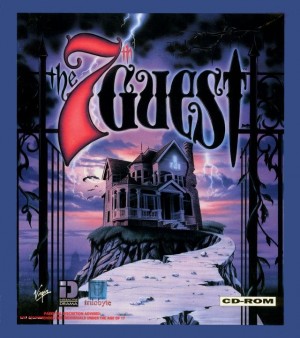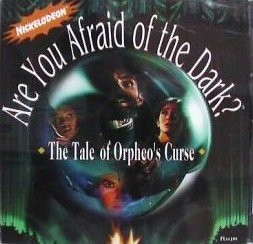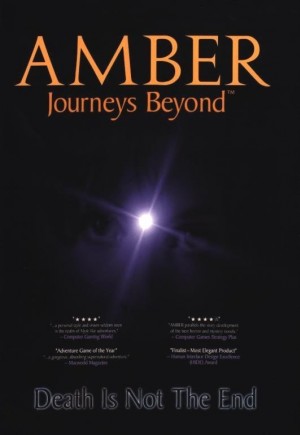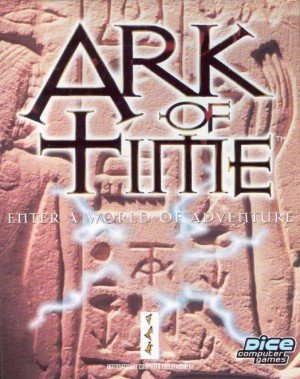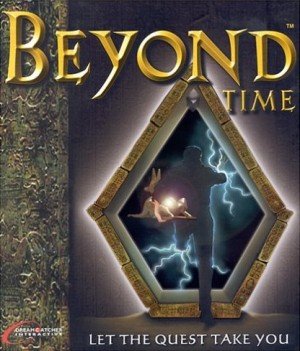Accessible Gaming page 2
Opinion & Special Features
Musings on the adventure genre, developer columns and other special features
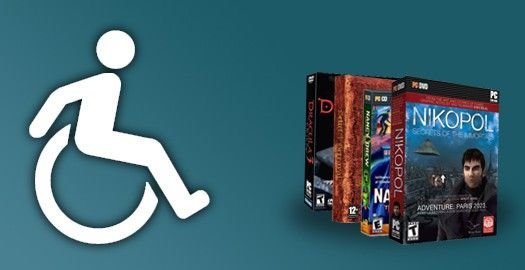
It’s easy to take common physical activities for granted, never considering the problems that others may have with things that are simple for us. This affects game designers as much as anyone else. Woe betide a colour-blind person or someone with hearing problems that tries to play even as mild a game as Myst, for example. And as we age, we may find that our own motor skills are lessened, reaction times dulled, and suddenly a whole load of games have become inaccessible to us. Studies have shown that the number of people who suffer from a reduced game experience totals in the millions. If age or accident or disease one day adds us to such statistics, what would we do then?
Barrie Ellis runs One Switch, a site dedicated to helping make games more accessible. As the third Thursday of November is World Usability Day, Adventure Gamers took the occasion to speak to Barrie, both to enlighten ourselves and to spread awareness of this issue: not only can game designers do better, but there are already ways around many problems so that anyone can play.
Adventure Gamers: What kind of disabilities affect gamers, and how does each type impact their ability to play games?
Barrie Ellis: There are four broad types of disability which a person may be affected by: Sight - Hearing - Mobility - Cognitive.
Sight related disabilities: A person who is colour-blind might find colour matching games impossible (such as Puzzle Bobble) if they can't distinguish the different colours. A person who has a visual impairment might find tiny fonts a problem (a problem suffered by many gamers of all abilities playing Capcom's Dead Rising on the Xbox 360 using a standard TV). Gamers with a high degree of visual impairment, or those that are completely blind, may find an Audio Game style of interface is the only way in.
Hearing related disabilities can arise in the form of essential game information not being relayed in an alternative format. If dialogue is not subtitled, then many deaf gamers will lose the gist of a game. Similarly, audio alerts and the like, without some kind of visual representation, can ruin a game for a deaf gamer. The Deaf Gamers website is a good resource here.
Mobility related disabilities can relate to a number of specific medical disabilities - and also to age. Some people will find a conventional Joypad controller a daunting prospect for many different reasons. Some will find the number of buttons too many, some the size too big, some too small, some just plain impossible if they can't use their hands. One size does not fit all. Game software interfaces often pose additional barriers - some are too fast and too difficult. Reconfigurable controls, speed control and meaningful difficulty options can make all the difference here.
Cognitive related disabilities can relate to being unable to read or type text 100% accurately, such as with dyslexia, people not speaking the language offered and those that are learning disabled for whatever reason. Some games, of course, will never be for all, but many could be with a little more consideration.
Finally, any person may be affected by one or more of these types. The Royal National Institute for the Blind have more information.
AG: Do you have an idea of how many people are affected by poor accessibility restricting their gaming experience?
BE: It's a lot. Consider that very young gamers are disabled until their hands are big enough to hold a traditional joypad. Consider at the opposite end of life, gamers will find that their abilities may have slowed and reduced over time. That covers just about everyone if they live a full life. Now consider hidden disabilities (such as dyslexia and deafness). Now consider people that don't speak your language. Now consider people that are recovering in hospital. Now consider every well known disability (Cerebral Palsy, Multiple Sclerosis, etc.). It's a lot. Some figures are to be found on the IGDA Accessibility blog.
AG: You run a website packed full of information for gamers with disabilities and game designers who want their games to be inclusive. How did you get started? Do you have a disability yourself?
BE: I started working for disabled people directly in the early '90s, working in a day centre in Essex, UK. This was the first time I'd met people who were so severely disabled and to be honest, I was a bit flummoxed at the very beginning. I wasn't sure how to have any kind of meaningful communication with people.
Having computer skills already, I was quickly introduced to their assistive technology computer suite. It consisted of two 8-bit BBC Micros with specialised interfaces. They had a large gated-joystick, touch screens and large wooden push buttons with twenty or so floppy disks full of educational software. I could clearly see that some people got a lot out of this stuff and that for some, it was a way to get some control. I wanted to find more things that were just pure fun that people could do for themselves, rather than having everything done for them.
I started to get to know people a lot better at this time. This led me down a path starting with me digging out my old Commodore 64 and using it in a music session with a joystick you could waggle to step through well known musical tunes. This was okay for some, but I wanted that one button interface that worked so well for most of the people there. I went home and hacked up a spaghetti junction interface that allowed me to connect those large wooden switches. Things quickly built up from there, starting with a BASIC program I wrote giving people the ability to roll dice and highlight Yes or No. We used this for a quite a few things, including playing Fighting Fantasy Adventure Game Books in a simplified way.
The more I looked into things, the more I realised that people of all abilities can get involved with fun activities no matter what the disability. I wanted to spread the word, and OneSwitch.org.uk was the result.
And in answer to your question, I don't consider myself to be disabled presently.
AG: Tell us a little more about yourself.
BE: I'm a rapidly mellowing fellow, happily settled into family life. I love "You'll See Glimpses" by Ian Dury as it sums me up (i.e. a bit naïve but very hopeful that things will get better). Old enough to remember seeing people queuing up to play Space Invaders and young enough to recall not being tall enough to see the bottom part of the screen.
AG: What are the most common problems that games present to people with disabilities?
BE: The lack of options to tailor a game to suit your own abilities. Probably the most common issues are with there being no facility to redefine game controls to suit yourself and no meaningful difficulty level choices.
AG: What are the main types of accessible controls available?
BE: There's a huge raft of hardware, from simple D.I.Y. adaptations, such as to make a joystick a bit longer, to highly advanced eye tracker technology that allows gamers to control a mouse pointer just by looking at a certain spot on their screen. Pure mouse pointer-based interfaces allow access via: mouse, track-ball, head-trackers, eye-trackers, touch-screens, interactive white-boards and more. Pure standard joypad interfaces allow access via a range of specialised controllers (with limits): some mouth-based controllers, switches, one-handed controllers, large controllers and so on. There are many software utilities that can aid a gamer too, such as 4Noah, which allows a gamer using a single button to play a game that needs more, and CPU Killer, which allows a user to slow their computer down.
Adventure Gamers: What gaming platforms are best for accessibility, both in terms of hardware and software?
Barrie Ellis: PC for accessibility, followed by the PlayStation 2 (thanks to its massive range of controllers).
AG: What makes these the best, and what makes other consoles, Macs, etc. worse?
BE: The PC has the hugest wealth of accessible controllers, utilities, and is capable of emulating the largest range of games consoles. This combination opens up games that were originally unplayable for many. The PlayStation 2 comes second best, for the same reasons. There aren't so many utilities, although the likes of Datel's Action Replay cheat disks can help massively.
The Xbox 360 is perhaps has the poorest accessibility wise, largely due to the restrictions Microsoft placed on third party controller manufacture. It has the least diverse range of controllers of any modern games console. Macs can be excellent, but have only a fraction of the accessibility utilities available. Believe it or not, the Wii is not that fantastic either for those unable to throw two arms about.
AG: For any game developers looking to make their games more accessible, what resources are there?
BE: The IGDA's Game Accessibility Special Interest Group have a friendly mailing list that people can access for help. They have a blog, too, with many useful links along the right hand pane. A couple of other useful links are Physical Barriers in Video Games and Retro Remakes forum.
AG: If you could choose one thing that all game designers would do to make their games more accessible, what would it be?
BE: Include a choice of adjustable difficulty levels that are meaningful to more people.
AG: How does having variable difficulty levels help improve accessibility?
BE: It simply gives the chance for a game to be enjoyable for more people, rather than a depressing drudge. Any kind of disabilities can make you slower or unable to perform all of the actions you need to do, so an easy level allows that slowness, etc. to be less punishing to the player.
AG: How hard is it to make a game accessible to everyone?
BE: Very hard indeed. There are some that are trying, such as UA-Games. However, I'm not personally pressing for that anyway: right now it's pretty easy to make most games more accessible for more people. There's not enough developers trying though, so that's what I'd like to see much more of now.
AG: Some people point out that the "able-bodied" may only temporarily be so, as illness, accidents and old age can affect anyone's ability to play games. Do you think in 50 or 60 years when all today's teenage console owners have developed arthritis and have slower reflexes that the accessibility of games will have improved?
BE: Surely things will have improved in 50 years!?! There's people now who were playing games 30 years ago (i.e. the Space Invaders generation) in their 50s and 60s now who have flocked to the DS and Wii due to their general accessibility over the likes of a Dual-Shock 3 controller. A greater breadth of games that can be made accessible can only be a better thing for all, whether you are disabled now or for when you very likely become disabled later. People like fun. Why should they be denied it?
AG: Adventure games often have an unhurried pace and require more thought than rapid mashing of buttons. What problems remain for accessibility in adventure games?
BE: Firstly, I want to say that many point-and-click style adventure games, with a pure mouse-based interface (ideally only needing the left click) are often brilliantly accessible for many. The unhurried pace alongside a simple interface is a big plus for many. But there are problems for some…
• A necessity for pinpoint accuracy mouse-skills: where highly precise aiming skills are needed, many gamers are cut out, especially so with eye-tracker gamers.
• No option to play the game within a window: if the game can't be played within a window, it won't be easy/possible for many gamers to make use of an on-screen keyboard if using a head or eye tracker. It can be harder for a gamer to quit the game too when needed.
• The written word: some gamers will struggle if there is no option to have the text spoken out loud (e.g. dyslexics). Some will struggle with tiny text. Some will struggle with words, full stop.
• No one or two-button interface: point-and-click adventure games are a nightmare for those who can only use big button switches (aka "switch gamers") and cannot move a mouse or equivalent - they often require masses of button presses to get anywhere. To my knowledge there is just one – Invincible Island which really works for players limited to using only one or two buttons.
AG: Have you played many adventure games yourself? What's your favourite?
BE: I have played a fair few over the years and pretty much like something from all types. I started with Merry Christmas by Melbourne House, which was a giveaway for the C64. I've always liked the LucasArts games such as Full Throttle and I've always meant to go back and play some Magnetic Scrolls games but never had time. I like Infocom's style of old, love the Ace Attorney DS games. Favourite adventure game of the moment? Spooks still, I think.
AG: Is it hard to find games that are widely accessible right now?
BE: Yes and no. What is accessible depends upon your abilities, obviously, and if you can play with help or play completely independently. A good starting point, besides One Switch itself, might be SpecialEffect.
AG: I don't want to be controversial, but are accessible games boring? Sometimes it seems that they are ones with very simple controls or that are very slow or are a very easy version of another game.
BE: My definition of an accessible game is ANY game that you can play and have fun with. If you can't play it, it's going to become boring very quickly.
AG: Are there any free accessible games that I can try right now?
BE: Of course! How about these for starters...
Peggle and Bejewelled (great for some head-tracker gamers), 6 Differences (eye tracker gamers), Move or Die (head-tracker gamers), Aurikon (one button), Strange Attractors (one button) and a ton of audio games.
Any why not try perhaps the world's most (deliberately) inaccessible game whilst you're here: Game Over.
AG: Thanks for sharing these insights with us, and we at Adventure Gamers would like to express our support for what you're doing at One Switch, and for all those working to make fun more accessible!
BE: Likewise - thanks so much for the chance to get the word out to a new audience. I really appreciate it.



